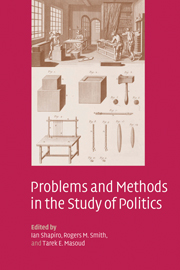Book contents
- Frontmatter
- Contents
- List of contributors
- Acknowledgments
- 1 Introduction: problems and methods in the study of politics
- Part I Description, explanation, and agency
- Part II Redeeming rational choice theory?
- Part III Possibilities for pluralism and convergence
- 12 The illusion of learning from observational research
- 13 Concepts and commitments in the study of democracy
- 14 Problems chasing methods or methods chasing problems? Research communities, constrained pluralism, and the role of eclecticism
- 15 Method, problem, faith
- 16 Provisionalism in the study of politics
- 17 What have we learned?
- Index
17 - What have we learned?
Published online by Cambridge University Press: 22 September 2009
- Frontmatter
- Contents
- List of contributors
- Acknowledgments
- 1 Introduction: problems and methods in the study of politics
- Part I Description, explanation, and agency
- Part II Redeeming rational choice theory?
- Part III Possibilities for pluralism and convergence
- 12 The illusion of learning from observational research
- 13 Concepts and commitments in the study of democracy
- 14 Problems chasing methods or methods chasing problems? Research communities, constrained pluralism, and the role of eclecticism
- 15 Method, problem, faith
- 16 Provisionalism in the study of politics
- 17 What have we learned?
- Index
Summary
Robert A. Dahl: Complexity, change, and contingency
I am simply going to set out, perhaps somewhat more dogmatically than is appropriate, a set of observations. I think some of you will disagree with some of them. Some of you may disagree with all of them. If it turns out that most or all of you agree with all of them, then I am wasting your time and my own by being here.
I begin with a question and observation: What is our subject? What is political science? For those of you who have read some of my work over the years it won't come as a surprise that my answer to the question is this: political science is the systematic study of relations of power and influence among human beings. My observation is: if you define political science in this way, then the study of politics is perhaps a subject of greater complexity than any other area of scholarly research, writing, and teaching.
There are, I believe, at least three reasons why the study of politics is a subject of exceptional complexity.
First, consider the number of possible relations of power and influence among relevant units. Perform a simple-minded thought experiment: identify some of the possible relations of power and influence among two people. You'd come up pretty quickly with a list of five possible relations, maybe ten, maybe more; but let's be modest and settle for ten.
Information
- Type
- Chapter
- Information
- Problems and Methods in the Study of Politics , pp. 377 - 394Publisher: Cambridge University PressPrint publication year: 2004
Accessibility standard: Unknown
- 7
- Cited by
